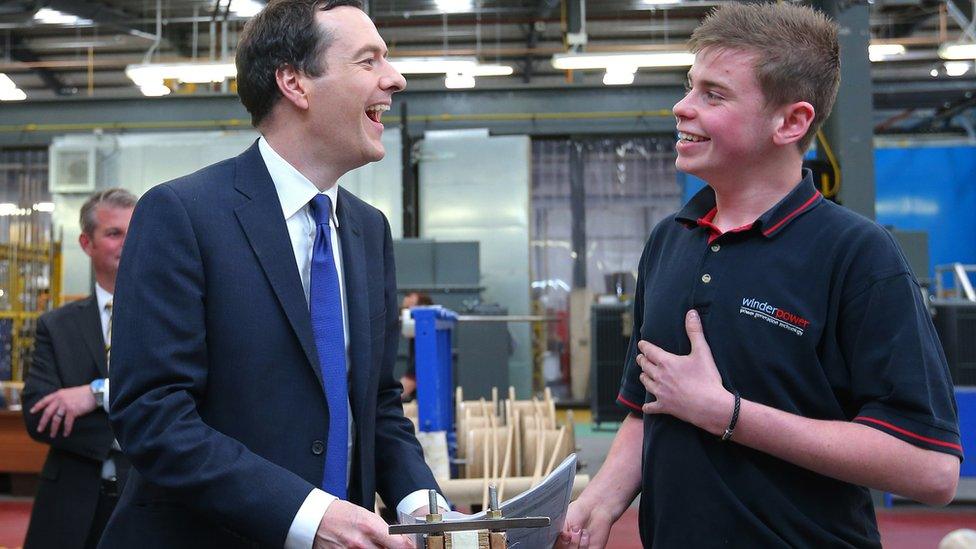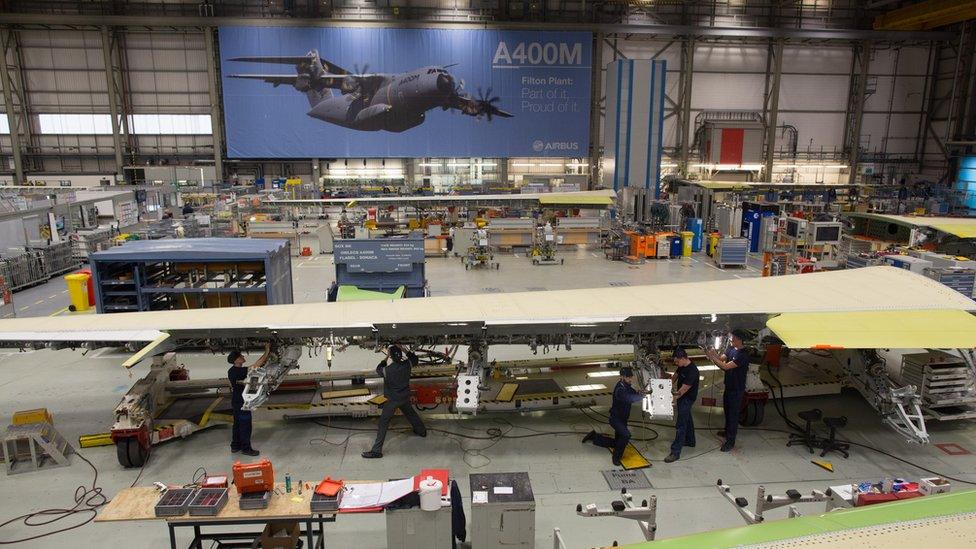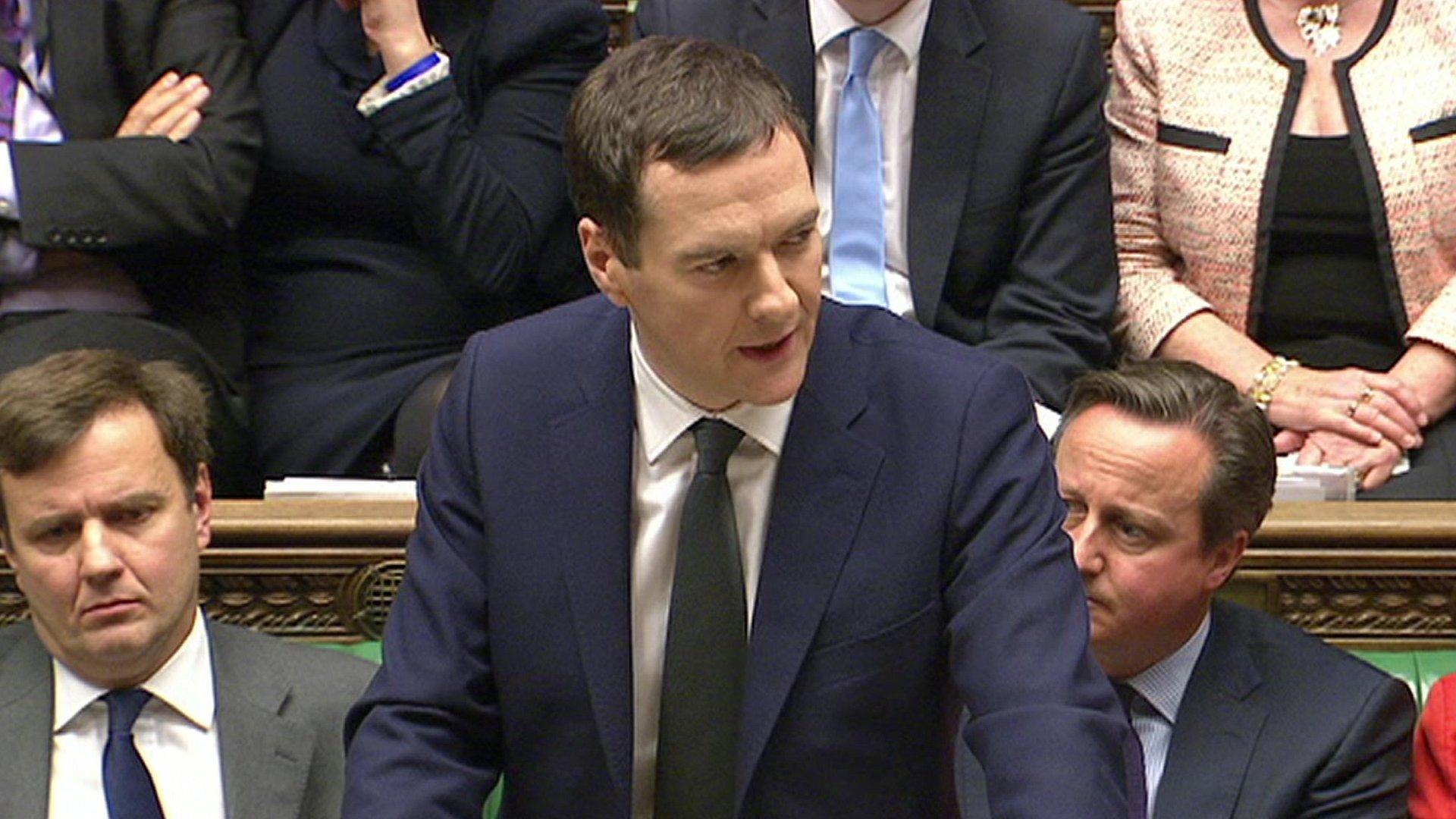Autumn Statement: Apprenticeships levy to raise £3bn
- Published

Chancellor George Osborne meets apprentice Jordan Hankin on a visit to Winder Power in Pudsey in May.
A new apprenticeship levy of 0.5% on company payrolls will raise £3bn a year and fund three million apprenticeships, the chancellor has announced.
The new charge will be imposed from April 2017 and help ensure that big business shoulders the cost of training workers, George Osborne said.
But business groups have described the levy as a new "payroll tax".
The Institute of Directors said it would be a big cost for many companies, including medium-sized firms.
The CBI said it was a significant extra tax for business that would hit many smaller companies.
Only businesses with a wage bill of more than £3m will pay the levy, which the government said would exempt 98% of employers.
Mr Osborne told the Commons: "It's a huge reform to raise the skills of the nation and address one of the enduring weaknesses of the British economy."
But Institute of Directors director-general Simon Walker said: "We are very concerned by the government's assumption that a quarter of the money collected will be spent on just administering the levy.
"Firms have been promised they will get back more than they put in, but it's not clear how this will happen if so much is being lost in bureaucracy."
CBI director-general Carolyn Fairbairn said the levy was the sting in the tail for business in the chancellor's statement.
The Office for Budget Responsibility, the organisation that compiles forecasts for the government, said that the levy would help reduce wage growth over the next five years by 0.7%.
The OBR added: "We assume that most of the cost will ultimately be borne by employees."
Chris Sanger, head of tax policy at EY, said the chancellor had tried to sugar-coat the introduction a new tax, which accounted for more than half of the tax rises announced in the Autumn Statement.
British Retail Consortium director-general Helen Dickinson said: "The government is absolutely right to want to increase the number of apprenticeships but in doing so it must make sure the quality is increased too."
However, Petra Wilton, of the Chartered Management Institute, said: "If businesses want a skilled workforce then it's only right that they pay for it."
R&D grants
In other announcements affecting business, £165m of research and development grants distributed through Innovate UK will be turned into loans. The chancellor said this approach had been used successfully in France for years.
An Innovate UK spokesman said the change meant that it would "have to focus its work within a new operational funding framework".
John Longworth, British Chambers of Commerce director-general, said it was important that replacing grants with loans did not "reduce our dynamism in the global economy".
The BCC also welcomed increased spending on infrastructure, particularly for the road network, which it said would help businesses to expand.
Aerospace

The Airbus factory at Filton in Bristol makes wings for its planes
Support for the aerospace and automotive industries will be maintained at existing levels for the next decade.
Paul Everitt, chief executive of ADS Group, which represents aerospace, defence, space and security companies, said the move was "an unprecedented vote of confidence" for the UK aerospace industry.
"Long-term funding for aerospace R&D will ensure our industry remains globally competitive and one of the most attractive locations for this high value and high skilled activity," he said.
Business rates
Mr Osborne said the business rate relief scheme would be extended for another year, helping 600,000 small firms.
John Allan, chairman of the Federation of Small Businesses, said its members would be relieved by the extension, although the CBI's Ms Fairbairn added: "Many firms will be disappointed to have been kept hanging on for a much-needed review of business rates until next year's Budget."
The BRC said that the High Street retail discount - worth up to £1,500 a year to shops, cafes, pubs and restaurants - had not been renewed in a move that retailers would find "very disappointing".
Annual business rates for the average small shop will breach the £9,000 level for the first time next year, according to retail expert Paul Turner-Mitchell.
"The Autumn Statement was terrible for both the retail sector and those who have campaigned long and hard for the meaningful structural reform of the system," he said. "It's a real kick in the teeth and the government has just simply not listened."

Autumn Statement and Spending Review 2015

Presented by Chancellor George Osborne, the Spending Review sets out what government spending will be over the next four years, while the Autumn Statement is an annual update of government plans for the economy.
Special report: Full in-depth coverage of the Spending Review and Autumn Statement
Documents:, external Link to full Autumn Statement and Spending Review documents via HM Treasury
What it means for you: How the Autumn Statement and Spending Review will affect your finances

- Published25 November 2015

- Published25 November 2015

- Published25 November 2015

- Published26 November 2015
